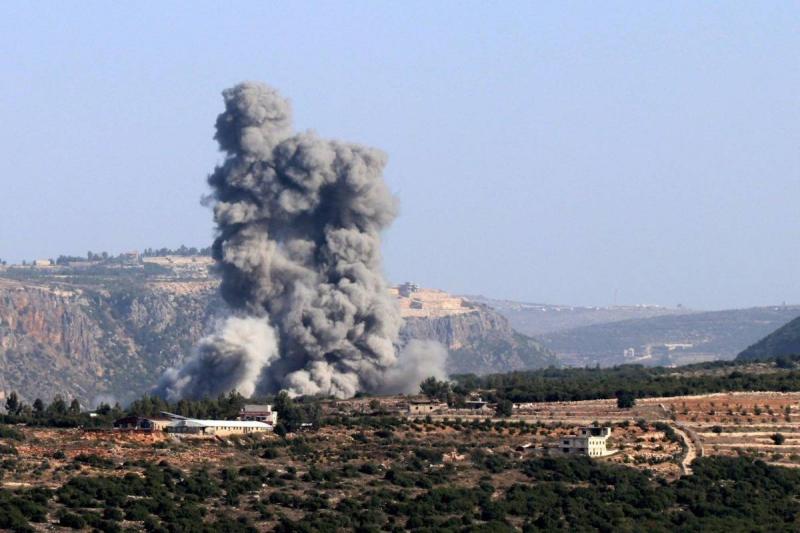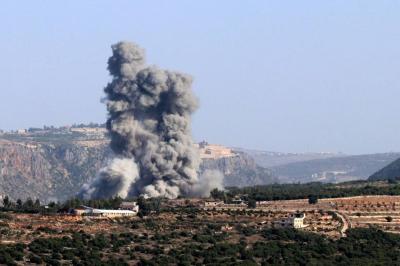Israel has warned that attacks by "Hezbollah" along the border with Lebanon cannot continue and will necessitate a harsh response. It has raised the level of threat directly and through open international messages, insisting that the party withdraw beyond the Litani River or else southern Lebanon and the capital Beirut will be "destroyed" just like Gaza City and Khan Yunis. What can Israel do, and how will the reaction unfold?
Undoubtedly, the Israeli army possesses destructive power that no other army in the Middle East has, enjoying support from munitions from all NATO countries, allowing it to ramp up bombings and destruction without regard to ammunition depletion or costs. Recently, the Israeli army has been observed using warplanes more than drones in the skies over Lebanon, demonstrating its harsh response with concentrated destructive bombardments and a determination to inflict pain on "Hezbollah" due to the lack of calm along the northern front. This was also noticeable through its use of incendiary shells to close resistance withdrawal routes and to target at least one goal, sending a message that it can exercise overwhelming force as long as it enjoys support from the Western world without being held accountable for its actions.
If the Israeli army wishes to commit to bombings in southern Lebanon within the three to five-kilometer limits set by "Hezbollah" since the beginning of the war on Gaza, it can destroy dozens of border villages within the entire engagement zone, demonstrating its determination to impose severe costs on the party's environment.
Meanwhile, "Hezbollah" has begun to respond to the destructive power it receives with the strength of "volcano" rockets weighing half a ton, which have angered Israel because their short range does not allow the "Iron Dome" to intercept the rockets in time, and thus, the sirens cannot alert those present in the settlements, currently populated only by soldiers after the settlers were evacuated. Consequently, Tel Aviv is very disturbed by "Hezbollah's" escalating bombardments every day, utilizing heavy-caliber rockets to match the counter-bombardments on villages that have started hitting streets in the southern and border cities within approximately three kilometers.
However, the matter goes far beyond that. With the Houthis in Yemen entering the fray with significant influence, the balance of power has changed. By closing the Bab-el-Mandeb Strait to any vessels bound for Israel, regardless of their flags or ownership, the Houthis have caused a "storm" in the Red Sea. The United States has taken it upon itself to ensure maritime safety and international passage, and the Houthis' decision clashes with the maritime security that the U.S. has committed to guarantee for Israel. As a result, Washington has found itself faced with difficult choices it would prefer to avoid, realizing that the least harmful option is to cease hostilities in Gaza. Washington does not want to expand the conflict to include other countries because it is unaware of what the "Resistance Axis" might hold for it and where matters could lead.
Moreover, "Hezbollah" would not hesitate to close the Mediterranean Sea if Israel waged war on Lebanon and escalated its destruction to the point where all seas bordering Israel become "sealed off." Additionally, "Resilience Forces," which concern Israel and are deployed along the southern lines, have sent drones to energy extraction platforms above Karish and cities controlled by Israel, returning them to their launch bases without being intercepted by radar.
A large number of kamikaze and strike drones have also been used against Israeli positions and homes where special forces are stationed along the border to reveal some of the resistance's hidden capabilities. What has bothered Tel Aviv even more is "Hezbollah's" possession of intelligence on the movement of its forces and their redeployments along the border and the concentration of Israeli special units in specific locations, as well as command and control centers. This has allowed the party to target certain valuable goals based on the electronic information that reconnaissance forces can provide as a renewable target bank for the "Resilience" missile capacity deployed along the border.
"Hezbollah" has asked friendly forces within the "Resistance Axis" to leave the south, as it does not need any support. However, any Israeli attack aimed at destroying Lebanon has its own calculations that could open various fronts, the most important of which is the Iraq front, which is preparing to expand the battle when requested against targets in the land of the two rivers.
No one wants the war to expand except for Israel, which seeks to involve America to settle accounts with the Palestinians, aiming to expel them from the West Bank and Gaza Strip... and Lebanon. However, it cannot achieve its objectives without directly involving the Americans, beyond the current level of planning, intelligence, and logistical support. But Washington does not want to escalate the conflict, so it sends its envoys, such as CIA Director William Burns to Iraqi Prime Minister Muhammad Shia al-Sudani, asking him to halt attacks that have reached nearly 100 against American forces.
The U.S. also requests National Security Adviser Jake Sullivan to visit Israel and set a timeline for ending military operations without relying too much on an accommodating response from Prime Minister Benjamin Netanyahu, who cannot stop the war without achievements; otherwise, his fall is inevitable, and accountability is sure to follow.
Thus, according to the Kuwaiti newspaper Al-Rai, there will be no comprehensive war and no American appetite to see the front expand as it has its electoral war, which threatens the current administration’s future due to its stance on the killing of children and women in Gaza. However, Netanyahu's determination to save himself hinders efforts to end the fighting. Meanwhile, the countdown is exhausting Israel due to the steadfastness and bravery of the Palestinian people and global popular pressure. But Netanyahu's madness in opening multiple fronts and his determination to destroy Gaza along with its inhabitants drives him to commit further civilian killings without relent even after more than two months of fighting.




